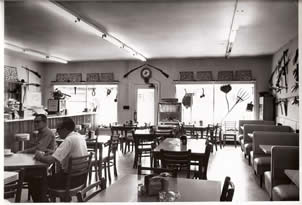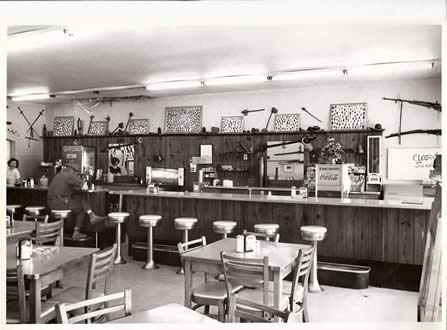 |
Memories of Cowan CaféBy: L. Jarod Pearson
A fair number of wonderful institutions have defined the character of Cowan throughout the years. One of those defining institutions was the Cowan Café, an entity that Cowan residents, Sewanee alumni and visitors passing through town all fondly remember to this day.
Cowan had a reputation for fine restaurants as far back as the Year 1886. Cowan Café, which came into existence five decades later, appealed to hungry appetites near and far from here. By the time Cowan Café ceased to exist, fine restaurants had existed in Cowan for more than a century.
To understand the birth of this famous institution, we have to zero in on the strategic planning of a very prominent Cowan resident and civic leader. Mr. Frank Pearson, Sr., a major player in Cowan’s 1922 City Charter, built a sturdy, art deco-style, poured-concrete building in downtown Cowan in 1939. The timing of this construction coincided with the recruitment of the Genesco shoe factory and the Cumberland Portland Cement plant, both of which were heavily influenced by Mr. Pearson. Besides a large glass storefront, the building also incorporated a restaurant space to capitalize on its location near a factory.
The building was not located on a major thoroughfare at the time of its construction, but Mr. Pearson was instrumental in changing that. State Highway 41A not only used the street in front of the Pearson building for a right-of-way, but also used the Cowan Cement Plant as a major contractor for the highway construction. This development means that the retail space and restaurant space were conveniently located between a prominent factory and a major thoroughfare.
A ready-to-go restaurant in a vital location appealed to the Gunn family who leased the space and opened Cowan Café in 1940. The Gunn family had moved to Cowan a few years prior from Gunn Hollow (in the Belvidere area near Falls Mill). Ruth Gunn McNutt and her brother Brooks ran the restaurant for the first few years. After World War II, Ruth and her husband Cortner moved back to Cowan and took over the entire operation.
In only two years the business at Cowan Café grew so large that the Gunn family constructed a new restaurant across the street and two blocks east. The new home for Cowan Café provided a larger, more modern kitchen and additional dining capacity. It was definitely a good move because the business grew beyond the expectations of its owners.
US Highway 64, a major East/West route through Tennessee incorporated the Highway 41A footprint through Cowan, which fueled additional highway traffic. Besides the growth in automobile travel, Sewanee students quickly adopted Cowan Café as the prime spot for home cooking away from home. For years Mrs. McNutt did not know which sector gave her the most business. She does, however, recall in the mid-1960’s when The University of the South passed a controversial restriction on automobiles: students who did not make straight A’s were disallowed to have an automobile on campus! This new policy hurt business at Cowan Café until a couple years later when the policy was rescinded.
The construction of Interstate 24 also took a toll on business at Cowan Café as US 64 became less important for East/West travel through Tennessee. However, business from Cowan locals never ceased. Besides daily business from Cement Plant workers, shoe factory workers, and downtown business owners, Cowan Café was also the meeting place for Cowan Rotary Club and Cowan Lions Club.
Mrs. McNutt and her daughters (Barbara, Becky, Betty, and Bonnie) have countless memories with some that stand out more than others. Ruth remembers a little boy who left his hat on a coat rack. He came back with his family 10 years later and found the hat exactly where he’d left it! She also remembers high school kids gathering at the café in the mornings to wait for the school bus and also on Friday nights after the ballgames.
For patrons, the menu at Cowan Café is what stood out most of all. Plate lunches, burgers, ham sandwiches, and homemade pies, to give you a mere sampling. Oh, and the French fries? They were hand cut! The evening meals consisted of steaks, chicken, and salads along with a marketplace special every now and then. Breakfast was everything you would expect to find in a rural Tennessee establishment. Any time of day the food was fabulous and so was the hospitality!
Another aspect of Cowan Café that made it famous was Ruth’s personal collection of tools, guns and other memorabilia from the pioneer days, the Civil War and World War I that covered the walls of the restaurant from front to back. Each and every day these relics served as conversation sta
When Cortner McNutt passed away in 1979, Ruth leased the restaurant to another Cowan local who was driven to success. Mrs. Doris Miller took over the café and ultimately took full ownership in 1982. While Mrs. McNutt’s historical collections were relocated, Doris replaced the relics with railroad memorabilia.
Even though Cowan was in a period of economic decline, Doris and members of her family kept a steady pace day in and day out. Every morning was the daily news discussion followed by the typical lunch crowd at midday. And Sunday afternoon felt like one big family reunion!
It was also under the Miller’s ownership that the infamous Cowan Coffee Club came into existence. The table full of story-tellers made every day, shall we say, anything but ordinary! The most notorious aspect of the Coffee Club was the Liar Board. Whoever told the biggest and most unbelievable story of the week was elected Liar of the Week and had his or her name fixed on a burnt-wood plaque and hung on the wall for everybody to see. The writer of this article was never thrilled to see his grandfather’s name on the wall at least once or twice a month!
In the late 1980’s, Mrs. Miller began to have health problems. Although the restaurant stayed open and maintained a strong, steady business, Doris had to cut herself back to working only a few days a week and a few hours per day. Unable to lead the business as she had in the past, Doris made a difficult decision to sell Cowan Café in 1990. From that point, the restaurant was reinvented, remodeled and renamed, effectively ending the institutional tradition of Cowan Café.
The original Cowan Café, located in the historic Pearson building, today houses the Whistle Stop Café South. The Cowan Café building constructed by the Gunn family also stands today. The following restaurants have existed there since 1990: the Cowan Country Inn, Bobby D’s, Cline’s, and Pancho’s.
Cowan Café was truly an important part of our small town way of life and it’s an institution we will remember and celebrate. I conclude this article by personally thanking Mrs. Ruth McNutt. She closed her interview with me by saying: “We had a wonderful business for 37 years!”
Click here to view an old menu from Cowan Cafe in pdf format. Cowan Residents Remember Cowan Café
Brenda Garner Tate writes: “I remember this story my mother, Clara Hanson, told me about an incident at McNutt's Cafe. The hat factory had opened in their new location. (Where the carpet mill is now). My mother was a supervisor. Some of the dignitaries from Connecticut were here. Several of the folks, including my mother, went to lunch at McNutt’s. McNutt's had delicious plate lunches (as they were called back then) and you could choose from a wide variety of vegetables and two or three meats. They also had the usual burgers, cheeseburgers, bacon and tomato sandwiches, etc. That particular day the special was fried chicken. "Mr. Smith" as I'll call the man from Connecticut couldn't seem to decide on anything listed on the menu so he told the waitress he would have a chicken sandwich. She told him they didn't have chicken sandwiches. Mr. Smith was quite upset and asked "Well do you have bread?" "Yes" replied the waitress. "Then do you have chicken?", Mr. Smith asked. "Yes", said the waitress. "Well, put some chicken on the bread and bring me the sandwich", Mr. Smith demanded. The waitress went to the back and returned in just a few minutes. There on the plate between two pieces of bread was a large drumstick. Everybody but Mr. Smith had a good laugh.”
Brian Hannah writes: “McNutt’s café had a lot of items on consignment for people to view. I was so amazed at looking at it! Just ask the people who remember it!”
|

